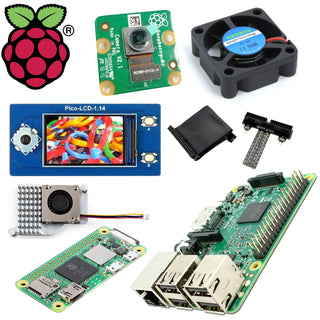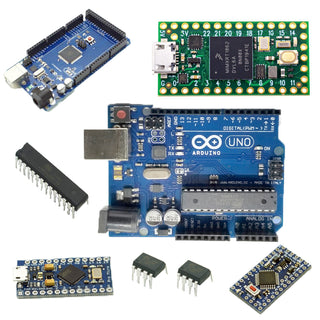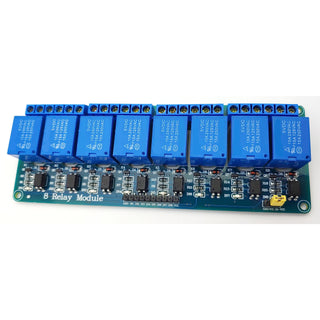8-Channel Relay Module for Arduino (D20)(D37))
- Unit price
- / per
8-Channel Relay Module for Arduino available in two versions. A 5V controlled version VUPN5938. And a 12V controlled version VUPN688.
The 5V controlled version VUPN5938:
This board provides 8 optically isolated inputs that accept a wide range of voltage, including the 3VDC and 5VDC signals available on the Arduino. This is a great way to switch on or off AC or DC loads using your Arduino!
The relays are single-pole double-throw (SPDT) and are rated for 10A @ 250VAC. The ground for the relay coils is separate from the ground for the input signals. This, along with the optical isolation, provides a total galvanic isolation between the input and output. The two grounds could be joined together if desired with the included jumper.
The relay coils run on 5VDC, and the module has screw-terminal blocks for sturdy and reusable attachments for the external load. The signal and power inputs run through the male single-row header.
The 12V controlled version VUPN688:
This board provides 8 optically isolated inputs that accept 12V DC signals available on the Arduino. This is a great way to switch on or off AC or DC loads using your 12V DC Signal source!
The relays are single-pole double-throw (SPDT) and are rated for 10A @ 250VAC. The ground for the relay coils is separate from the ground for the input signals. This, along with the optical isolation, provides a total galvanic isolation between the input and output. The two grounds could be joined together if desired with the included jumper.
The relay coils run on 12V DC, and the module has screw-terminal blocks for sturdy and reusable attachments for the external load. The signal and power inputs run through the male single-row header.
NOTICE:
-The down side of the 12V relay module (VUPN688) is that Ground is not common. In this circumstance Positive is the common. Which means that each relay needs a separate, individual ground connection to activate. As opposed to what people would normally assume where each INput would be a positive contact. It makes this very difficult to use with a microcontroller or in a situation where you want or need to controll something with positive voltage. Since microcontrollers usually use 3.3v or 5v logic, this relay module also could NOT be controlled buy such devices without extra transistors or more circuits that one might want to assemble.
-We are unable to provide specific relay part numbers for the relays that are actually soldered to these modules. They will have the correct matching electrical values and ratings, but the manufacturer and part numbers will rarely be the same from batch to batch.
-PCB Color will Vary. (May come in red, green, black, blue, etc.)
QTY: 1 x 8-Channel Relay Module for Arduino
IN STORE LOCATION: VUPN688 AKA the 12 volt version is located in the NEW section of the arduno storage area behind the counter.
8-Channel Relay Module for Arduino (D20)(D37))
- Unit price
- / per
Adding product to your cart
You may also like
8-Channel Relay Module for Arduino available in two versions. A 5V controlled version VUPN5938. And a 12V controlled version VUPN688.
The 5V controlled version VUPN5938:
This board provides 8 optically isolated inputs that accept a wide range of voltage, including the 3VDC and 5VDC signals available on the Arduino. This is a great way to switch on or off AC or DC loads using your Arduino!
The relays are single-pole double-throw (SPDT) and are rated for 10A @ 250VAC. The ground for the relay coils is separate from the ground for the input signals. This, along with the optical isolation, provides a total galvanic isolation between the input and output. The two grounds could be joined together if desired with the included jumper.
The relay coils run on 5VDC, and the module has screw-terminal blocks for sturdy and reusable attachments for the external load. The signal and power inputs run through the male single-row header.
The 12V controlled version VUPN688:
This board provides 8 optically isolated inputs that accept 12V DC signals available on the Arduino. This is a great way to switch on or off AC or DC loads using your 12V DC Signal source!
The relays are single-pole double-throw (SPDT) and are rated for 10A @ 250VAC. The ground for the relay coils is separate from the ground for the input signals. This, along with the optical isolation, provides a total galvanic isolation between the input and output. The two grounds could be joined together if desired with the included jumper.
The relay coils run on 12V DC, and the module has screw-terminal blocks for sturdy and reusable attachments for the external load. The signal and power inputs run through the male single-row header.
NOTICE:
-The down side of the 12V relay module (VUPN688) is that Ground is not common. In this circumstance Positive is the common. Which means that each relay needs a separate, individual ground connection to activate. As opposed to what people would normally assume where each INput would be a positive contact. It makes this very difficult to use with a microcontroller or in a situation where you want or need to controll something with positive voltage. Since microcontrollers usually use 3.3v or 5v logic, this relay module also could NOT be controlled buy such devices without extra transistors or more circuits that one might want to assemble.
-We are unable to provide specific relay part numbers for the relays that are actually soldered to these modules. They will have the correct matching electrical values and ratings, but the manufacturer and part numbers will rarely be the same from batch to batch.
-PCB Color will Vary. (May come in red, green, black, blue, etc.)
QTY: 1 x 8-Channel Relay Module for Arduino
IN STORE LOCATION: VUPN688 AKA the 12 volt version is located in the NEW section of the arduno storage area behind the counter.
You may also like
You may also like
Recommended products
Most orders arrive in 2-3 days
Our staff will go the extra mile to find your solution
A favorite of the Seattle area since 1989
PCI DSS compliant checkout




